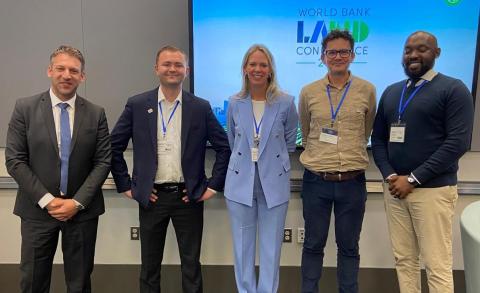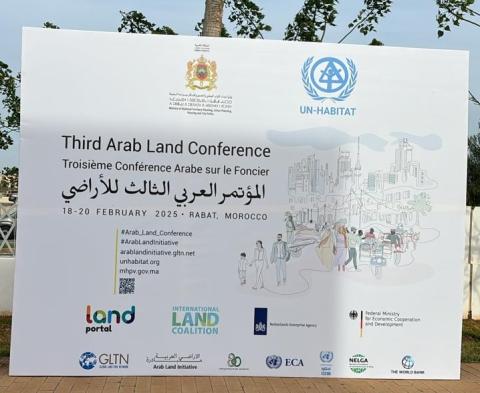Discover hidden stories and unheard voices on land governance issues from around the world. This is where the Land Portal community shares activities, experiences, challenges and successes.
 Follow our
Follow our
Sustainable Development Goals
Blog Series!
Interested in land corruption?
Follow our Land & Corruption Blog Series
for in-depth perspectives from the experts.
Issues
Geographical focus
As the world races toward climate resilience and sustainable development, one truth grows clearer: we cannot reach a just energy transition without just land governance. On May 6, 2025, the World Bank Land Conference hosted the session “From Data to Action: Tools to Monitor Corruption, Improve Transparency, and Enable a Just Energy Transition” to tackle the persistent challenge of land corruption and transparency head-on.
The Third Arab Land Conference, held in Rabat, Morocco from 18-20 February 2025 opened an avenue of possibilities for improving policies and practices to govern land in the Arab world. From the launch of several groundbreaking initiatives to empowering women and youth, and fostering data transparency and academic excellence, the event showcased commitments and collaborative work shaping the future of land governance in the region.
Photo credit: LAND-at-scale
On February 27, 2025, the Land Portal Foundation hosted an insightful webinar on Exploring Sustainable Financing of Land Registration and Land Governance. As financial sustainability remains a major challenge for land administration systems worldwide, experts from Burundi, Uganda, Somalia, and international institutions shared their experiences and strategies to transition from donor-dependent models to self-sustaining financing mechanisms.
Third Arab Land Conference Session Summary
Third Arab Land Conference Session Summary
The High-Level Session on Land Management in Times of Crisis at the Third Arab Land Conference convened policymakers, experts, and practitioners to explore how effective land governance can mitigate these challenges, prevent future conflicts, and drive resilience.
Third Arab Land Conference Session Summary
Third Arab Land Conference Session Summary
In a rapidly urbanizing Arab region facing pressing challenges such as climate change, land scarcity, forced displacement, and governance gaps, the Third Arab Land Conference convened in Morocco to chart a path forward. Ministers, international experts, and key stakeholders gathered to discuss sustainable land governance, investment-driven solutions, and inclusive policies to foster stability, economic growth, and social equity.
Photo: Kandukuru Nagarjun, via Flickr, CC BY 2.0
The recent series of ALIGN articles shed light on how civil society, impacted communities and rights defenders across the world have used strategies such as legal action, publishing of mining contracts and stakeholder dialogues to change approaches to land-based investment governance.
The Land Portal Foundation, in partnership with Transparency International, hosted the webinar titled "Breaking New Ground: Insights and Stories on the Impact of Land Corruption on Discriminated Groups in Africa." The webinar brought together a panel of distinguished experts to delve into the challenges and complexities of corruption intertwined with discrimination in land rights and governance. This session provided crucial insights through detailed case studies and expert analyses, offering pathways towards more equitable land management practices.
Organized by the Cadasta Foundation, Land Conflict Watch, the Land Portal Foundation, National Council of Applied Economic Research (NCAER) of India, and NRMC Center for Land Governance, the webinar "The Digitization of Land Records: A Panacea for Land Conflicts" provided an in-depth look at the critical role digitization of land records plays in addressing land disputes in India.
Introduction
As part of a scoping study titled Land Governance for Climate Resilience: A review and case studies from LAND-at-scale projects headed by Richard Sliuzas, Emeritus Professor, University of Twente, GLTN dove into the links between climate and land governance in the ‘’Scaling up community-based land registration and land use planning on customary land in Uganda’’ project. This case study highlights experiences from the community-based wetland man












